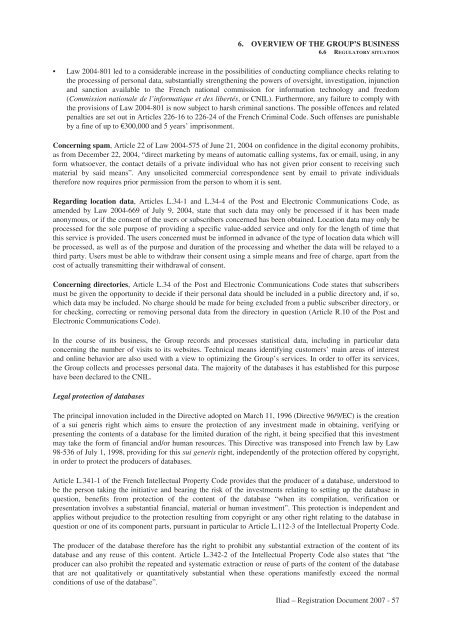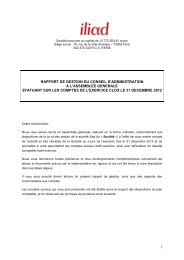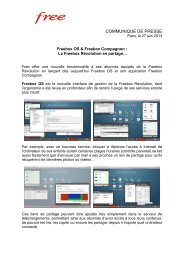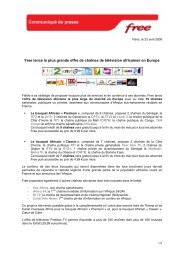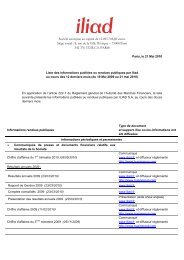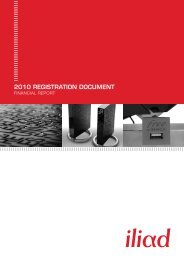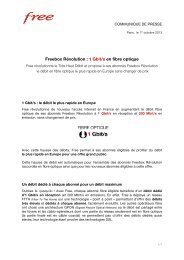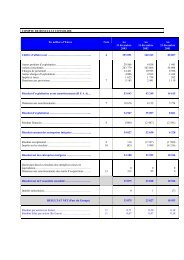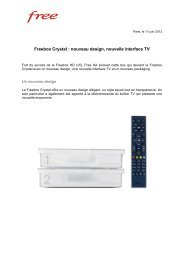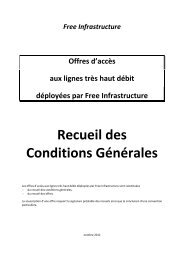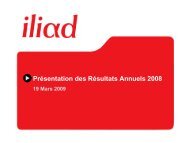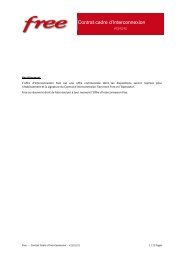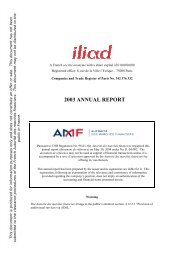REGISTRATION DOCUMENT AND FINANCIAL REPORT - Iliad
REGISTRATION DOCUMENT AND FINANCIAL REPORT - Iliad
REGISTRATION DOCUMENT AND FINANCIAL REPORT - Iliad
- TAGS
- registration
- iliad
- iliad.fr
Create successful ePaper yourself
Turn your PDF publications into a flip-book with our unique Google optimized e-Paper software.
6. OVERVIEW OF THE GROUP’S BUSINESS<br />
6.6 REGULATORY SITUATION<br />
• Law 2004-801 led to a considerable increase in the possibilities of conducting compliance checks relating to<br />
the processing of personal data, substantially strengthening the powers of oversight, investigation, injunction<br />
and sanction available to the French national commission for information technology and freedom<br />
(Commission nationale de l’informatique et des libertés, or CNIL). Furthermore, any failure to comply with<br />
the provisions of Law 2004-801 is now subject to harsh criminal sanctions. The possible offences and related<br />
penalties are set out in Articles 226-16 to 226-24 of the French Criminal Code. Such offenses are punishable<br />
by a fine of up to €300,000 and 5 years’ imprisonment.<br />
Concerning spam, Article 22 of Law 2004-575 of June 21, 2004 on confidence in the digital economy prohibits,<br />
as from December 22, 2004, “direct marketing by means of automatic calling systems, fax or email, using, in any<br />
form whatsoever, the contact details of a private individual who has not given prior consent to receiving such<br />
material by said means”. Any unsolicited commercial correspondence sent by email to private individuals<br />
therefore now requires prior permission from the person to whom it is sent.<br />
Regarding location data, Articles L.34-1 and L.34-4 of the Post and Electronic Communications Code, as<br />
amended by Law 2004-669 of July 9, 2004, state that such data may only be processed if it has been made<br />
anonymous, or if the consent of the users or subscribers concerned has been obtained. Location data may only be<br />
processed for the sole purpose of providing a specific value-added service and only for the length of time that<br />
this service is provided. The users concerned must be informed in advance of the type of location data which will<br />
be processed, as well as of the purpose and duration of the processing and whether the data will be relayed to a<br />
third party. Users must be able to withdraw their consent using a simple means and free of charge, apart from the<br />
cost of actually transmitting their withdrawal of consent.<br />
Concerning directories, Article L.34 of the Post and Electronic Communications Code states that subscribers<br />
must be given the opportunity to decide if their personal data should be included in a public directory and, if so,<br />
which data may be included. No charge should be made for being excluded from a public subscriber directory, or<br />
for checking, correcting or removing personal data from the directory in question (Article R.10 of the Post and<br />
Electronic Communications Code).<br />
In the course of its business, the Group records and processes statistical data, including in particular data<br />
concerning the number of visits to its websites. Technical means identifying customers’ main areas of interest<br />
and online behavior are also used with a view to optimizing the Group’s services. In order to offer its services,<br />
the Group collects and processes personal data. The majority of the databases it has established for this purpose<br />
have been declared to the CNIL.<br />
Legal protection of databases<br />
The principal innovation included in the Directive adopted on March 11, 1996 (Directive 96/9/EC) is the creation<br />
of a sui generis right which aims to ensure the protection of any investment made in obtaining, verifying or<br />
presenting the contents of a database for the limited duration of the right, it being specified that this investment<br />
may take the form of financial and/or human resources. This Directive was transposed into French law by Law<br />
98-536 of July 1, 1998, providing for this sui generis right, independently of the protection offered by copyright,<br />
in order to protect the producers of databases.<br />
Article L.341-1 of the French Intellectual Property Code provides that the producer of a database, understood to<br />
be the person taking the initiative and bearing the risk of the investments relating to setting up the database in<br />
question, benefits from protection of the content of the database “when its compilation, verification or<br />
presentation involves a substantial financial, material or human investment”. This protection is independent and<br />
applies without prejudice to the protection resulting from copyright or any other right relating to the database in<br />
question or one of its component parts, pursuant in particular to Article L.112-3 of the Intellectual Property Code.<br />
The producer of the database therefore has the right to prohibit any substantial extraction of the content of its<br />
database and any reuse of this content. Article L.342-2 of the Intellectual Property Code also states that “the<br />
producer can also prohibit the repeated and systematic extraction or reuse of parts of the content of the database<br />
that are not qualitatively or quantitatively substantial when these operations manifestly exceed the normal<br />
conditions of use of the database”.<br />
<strong>Iliad</strong> – Registration Document 2007 - 57


